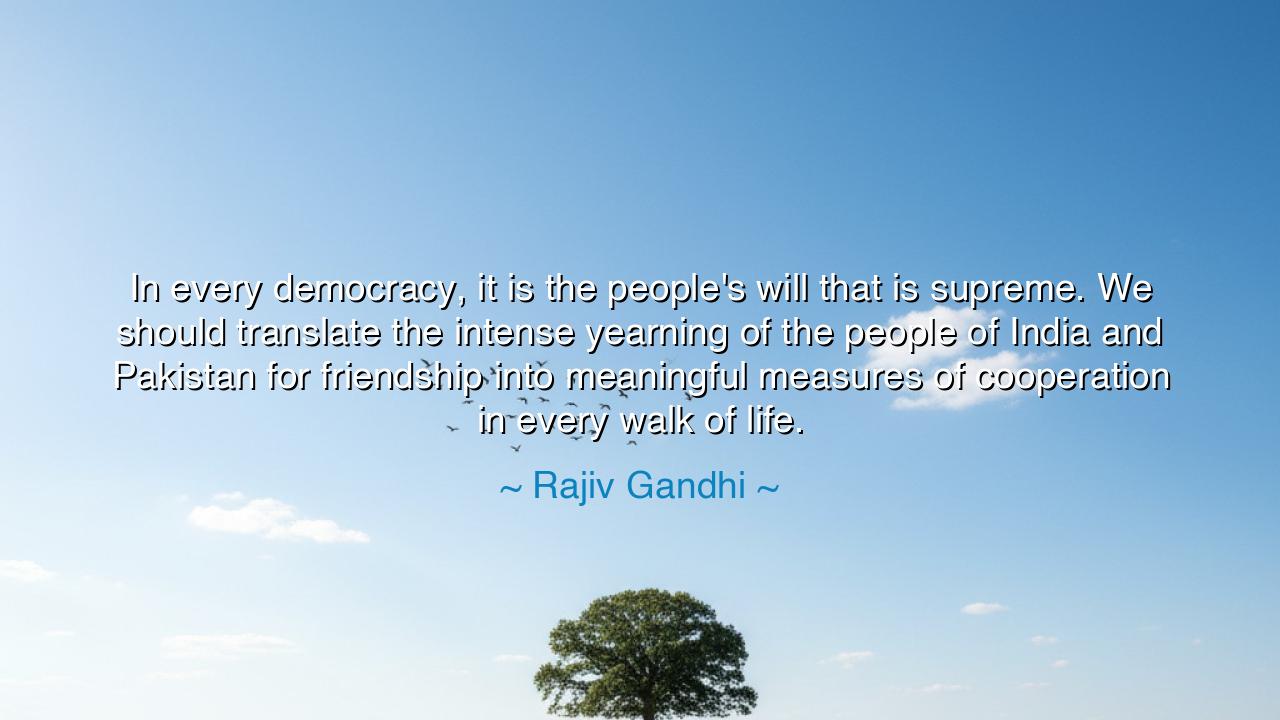
In every democracy, it is the people's will that is supreme. We
In every democracy, it is the people's will that is supreme. We should translate the intense yearning of the people of India and Pakistan for friendship into meaningful measures of cooperation in every walk of life.






In the hallowed halls of history, many have come and gone, but the words of a leader who speaks for the people carry the weight of destiny. Rajiv Gandhi, a man of vision and courage, understood that the heart of any true democracy beats with the will of its people. "In every democracy, it is the people's will that is supreme." These words ring through the ages, for they remind us that in the grand tapestry of governance, the people—their hopes, their struggles, their yearnings—are the threads that hold the fabric together. A democracy is not merely a system of rule, but a sacred trust, where the voice of the many shapes the destiny of the land.
But what, then, of the yearning of the people of India and Pakistan? In the history of these two nations, there has been much strife, much division, and yet, in the deepest recesses of their hearts, there is a shared desire for peace, for friendship. Both nations, born from the same soil, carried the same ancient wisdom in their bones, and yet were separated by the winds of discord. Rajiv Gandhi saw this yearning—this longing for connection, for cooperation—and he recognized that it was not merely a hope, but a call to action. The people's will, he understood, is not a passive force, but one that demands to be translated into meaningful measures of cooperation.
In the great tales of the past, we hear of kings who waged wars, but we also hear of those who sought peace—Alexander the Great, after his conquests, sought to bridge the gaps between East and West, building cities where cultures could meet, share, and learn from one another. In more recent times, we find the stories of Nelson Mandela, who, though imprisoned for decades, saw beyond the hatred that divided his people and worked tirelessly to build a new South Africa, one founded not on the scars of the past, but on the hopes for a better future. These men did not simply wield power; they understood that the true strength of leadership lies in recognizing the deep yearning of the people and acting to fulfill that yearning, regardless of the obstacles that may lie in their path.
Rajiv Gandhi's vision was not just political—it was human. It was a call for the leaders of both India and Pakistan to set aside their histories of conflict and strife and to listen to the collective voice of the people. That voice was not one of hatred or division, but one that longed for the day when friendship would replace fear and cooperation would replace competition. It was a dream that both nations, though scarred by war and division, could stand side by side, not as adversaries, but as partners in progress, united in their shared destiny.
Yet, let us not deceive ourselves into thinking that such dreams are easily realized. The path to peace is never without its trials, for the shadows of the past often cloud the brightest of futures. But the lesson that we must take from Rajiv Gandhi’s words is clear: the will of the people is supreme, and when that will is directed towards peace and cooperation, it cannot be denied. The leaders of India and Pakistan, much like the leaders of all nations, are the custodians of this will, and it is their sacred duty to ensure that the dreams of the people are translated into actions that bring about change.
In your own lives, dear ones, take this lesson to heart. In every action, whether in personal relationships, work, or society, listen for the deep, unspoken yearnings of those around you. Recognize the shared desires for peace, understanding, and connection that exist, even in the most divided of circumstances. Translate these yearnings into actions that foster cooperation, not just for the sake of peace, but for the growth and flourishing of all. Rajiv Gandhi’s words are not just a call to leaders, but to each of us. We are the people, and it is through our united will that the world will change.
The lesson to carry forward is that no dream of friendship or cooperation is too great, no matter how distant it may seem. Friendship does not grow overnight, nor does cooperation spring from the first efforts alone. It is the work of generations, the planting of seeds that will one day bear fruit in a future that may not be ours to see, but whose foundations we must lay. The yearning of the people is a sacred force, one that must be honored and acted upon. And in this, we learn that the true measure of leadership lies not in what is achieved in the present, but in what is left for those who follow—the enduring bonds of friendship, the lasting spirit of cooperation, and the flourishing of all who walk the earth together.






AAdministratorAdministrator
Welcome, honored guests. Please leave a comment, we will respond soon